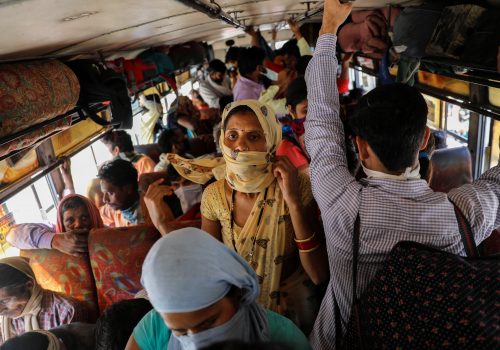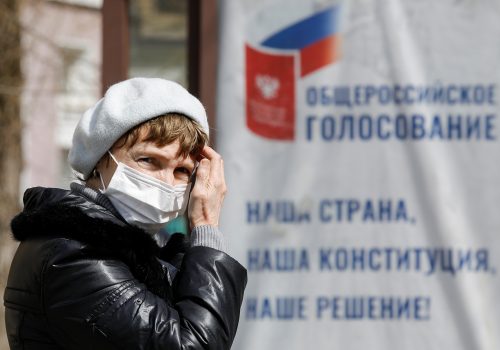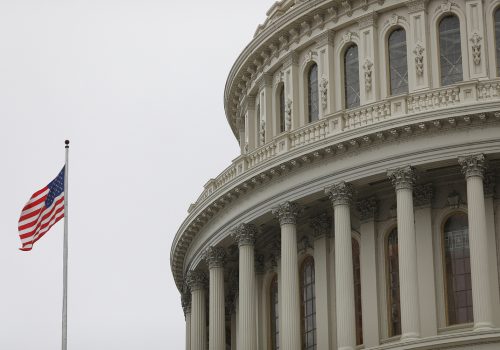CORONAVIRUS ALERT 3/30/2020
The Atlantic Council’s Coronavirus Alert is a regular summary of policy, economic, and business events around the emergency. To stay updated, sign up to the Coronavirus Alert here.
Summary:
US President Donald J. Trump extended travel restrictions through April 30 after expert Dr. Anthony S. Fauci predicted that the US death toll from coronavirus could be as high as 200,000 people. Cases worldwide continued to rise, albeit at a slower pace. More senior figures in the UK government were affected by the virus.
Statistics:
There are now in excess of 735,000 cases worldwide in more than 175 countries and territories; almost 35,000 people have died.
QUOTE: “People asked ‘when is this over?” New York Governor Andrew M Cuomo said, The New York Times reported. “When they come up with an inexpensive home test or point of care test that can be brought to volume.”
HEALTH AND SCIENCE:
- US President Donald J. Trump changed course on social restrictions on March 29 by extending the measures until April 30, and perhaps until June, after previously saying he wanted to relax coronavirus guidelines by Easter, The New York Times reported. There could be as many as 200,000 deaths from coronavirus in the United States, Dr. Anthony S. Fauci, America’s leading expert on infectious diseases, said in television interviews earlier in the day, the newspaper reported. He and other public health officials had urged Trump not to relax restrictions too soon, the newspaper said.
- Trump ordered General Motors to ramp up production of ventilators, invoking the Defense Production Act, which dates back to the Korean War, The Wall Street Journal reported.
- New York Governor Andrew M. Cuomo expects the outbreak of coronavirus in his state to reach its peak in fourteen to twenty-one days, The Washington Post reported. The state reported 237 new deaths from coronavirus, the biggest one-day toll so far, The New York Times said. The first of twenty-two flights arrived in the city on March 29 from China, carrying 80 tons of medical equipment, the newspaper reported. The presidential primary has been postponed to June 23 there from April 28, Reuters cited Cuomo as saying on March 28.
- The daily growth rate in new cases continues to be about 25 percent in the United States, compared with recent highs of almost 40 percent, the Financial Times reported. The metro area of New York has been less successful in flattening the curve—slowing down the pace of coronavirus infections—than Wuhan in China or Italy’s Lombardy region were at the same point in their outbreaks, The New York Times said.
- Daily confirmed cases of coronavirus fell on March 29 compared with the day before for the first time in several weeks, the Financial Times reported. There were 59,232 new cases, a decline of 10 percent on March 28, the FT said. The United States, Italy, Spain, France, and Iran—some of the world’s worst affected countries—posted declines on that basis, the newspaper said.
- Chicago’s Cook County jail, the United States’ largest single site jail, is home to a new cluster of coronavirus cases, CNN reported. Thirty-eight detainees tested positive on March 27, with 120 still to be tested that day, CNN said. “Jails in this country are petri dishes. They’re the government equivalent of nursing homes or cruise ships,” said Toni Preckwinkle, Cook County Board president, CNN reported. “It’s very difficult in a jail to maintain social distancing.”
- Drägerwerk, one of the world’s largest makers of ventilators, said worldwide demand for the machines will far outstrip supply, with the situation in the United States a particular cause for concern, the Financial Times reported. The company is on schedule to quadruple production of ventilators this year, the newspaper said.
- Coronavirus continued to affect the UK government. Prime Minister Boris Johnson said on March 27 that he tested positive for the virus, Health Secretary Matt Hancock followed suit, while Chris Witty, the chief medical officer, said he is self-isolating, Reuters reported. Dominic Cummings, special adviser to Johnson, developed symptoms over the weekend, the newswire said.
- The UK will do well to keep deaths from the virus below 20,000, a senior health official said on March 28, when the death toll rose by 260—the worst day so far—to reach a total of 1,019, Reuters also reported. Johnson wrote a “bleak letter” to citizens on March 29, exhorting them to stay at home to avoid the UK’s health service being overwhelmed, The Washington Post reported. It may take six months or more for the UK to get back to normal, the newspaper cited another UK official as saying.
- The number of coronavirus deaths in the Republic of Ireland has increased by ten to forty-six, with 2,615 cases confirmed, the BBC reported. The first of ten flights from China to Ireland carrying personal protective equipment arrived in Dublin March 29, part of a 208 million-euro deal, the BBC said.
- Russia will shut its borders temporarily after coronavirus cases increased sharply in the past week, Bloomberg reported. The country halted international flights on March 27, while Moscow’s mayor shut down all the city’s non-essential businesses the following day, the news agency said. On March 28, health officials reported 228 new cases of the virus overnight, taking the total to 1,264; four people have died from coronavirus.
- Medical-device maker Abbott Laboratories has launched a coronavirus test that can be conducted in as little as five minutes, Bloomberg reported. The company plans to supply 50,000 tests a day from April 1, the news agency said.
- “As Virus Spreads, China and Russia See Openings for Disinformation” runs a headline in The New York Times.
- It’s almost impossible to compare different countries’ death rates from coronavirus because there are so many uncertainties, especially around the true number of infections, the Financial Times reported. “Is comparing coronavirus death rates futile?” asks a headline by German broadcaster Deutsche Welle.
- Bolivia joined Panama in imposing an ID-based schedule for grocery shopping to prevent congregation in supermarkets and grocery stores. Colombia declared medicines and technologies to be in “public health interest,” which potentially allows the government to regulate prices and streamline key supplies imports. Previously, Costa Rica and Dominican Republic restricted the purchase of medical supplies. Argentina and El Salvador remain the only countries to impose price controls on essential goods for grocery shopping. Argentina, El Salvador, and Bolivia have announced they will sanction price speculation.
- Initial optimism about the use of artificial intelligence to analyze lung scans to detect coronavirus has in recent days turned to a growing debate about how plausible it is to build AI systems during a public-health crisis, news service Stat reported.
QUOTE: “From normal life to this hell in a week. That’s how long it took. How am I supposed to make any sense of that?” Tony Sizemore, said of the death of his girlfriend Roberta “Birdie” Shelton, The Washington Post reported. “She’s dead, and I’m quarantined. That’s how the story ends.”
FINANCE AND ECONOMICS:
- Congress and other stakeholders including economists and think tanks are already preparing the outlines of another phase of economic stimulus measures, even after last week’s estimated $2 trillion package of measures became law, The Wall Street Journal reported. A serious debate may start by late April, the newspaper said. “There’s talk of a multi-trillion-dollar program, given the size of the shutdown,” the Journal cited Stephen Moore, a fellow at the conservative Heritage Foundation, as saying.
- The United States looks set to lose its place as top oil producer following the recent drop in prices, a slump in demand, and lower investment, CNBC reported. That may have significant implications for foreign policy, CNBC added.
- The price of oil took a dive of 8 percent early on March 30, reaching a low not seen since 2002, and stocks fell on concerns that the coronavirus shutdown could last for months, Reuters reported. Australian equities were the exception following a mammoth government-support program, Reuters said.
- An estimated $200 billion of emerging-market debt owed to China, and which has gone unreported in official statistics in recent years, threatens dozens of countries as the global economy slows down and commodity prices drop, The Wall Street Journal reported.
- “[D]eveloped countries—even as they act to save themselves—must shift far greater public health and economic attention to fragile states and emerging markets, where the hit from the virus is likely to be far more devastating, destabilizing, and enduring,” writes the Atlantic Council’s Frederick Kempe.
QUOTE: “This is certainly not the end of our work here in Congress—rather the end of the beginning.” US Senate Minority Leader Chuck Schumer (D-NY) said as lawmakers completed last week’s record-breaking economic stimulus package estimated at $2 trillion, The Wall Street Journal reported.
BUSINESS AND TRAVEL:
- European low-cost airline EasyJet grounded its entire fleet of 344 airplanes as coronavirus paralyzed the travel market, with no clear idea of when it might get them back in the air, Reuters reported. The carrier will lay off its 4,000 cabin crew, based in the UK, for two months, the newswire said.
- De Beers cancelled a diamond sales event in Botswana this week because of travel restrictions imposed by the coronavirus crisis, the Financial Times reported.
QUOTE: “Several foreign countries have chartered flights to get our ventilators, but raw materials are becoming a problem,” said Li Kai, of manufacturer Beijing Aeonmed, ITV News reported. ““[W]e are struggling to get raw materials from abroad.”
RESOURCES
- Johns Hopkins University interactive web-based dashboard to visualize and track reported cases in real-time.
- CDC provides frequent updates and background information on Coronavirus.
- The World Health Organization daily situation reports.
- Harvard Business Review guidance on managing the emergency for corporate decisionmakers.
- The Society for Human Resource Management resources on managing communicable diseases.
- The Wall Street Journal has a useful guide to travel and travel insurance.
- State Department Travel Advisory for China.



